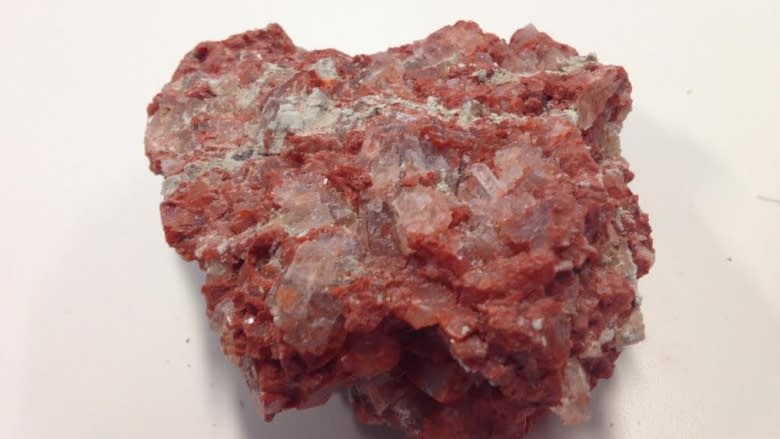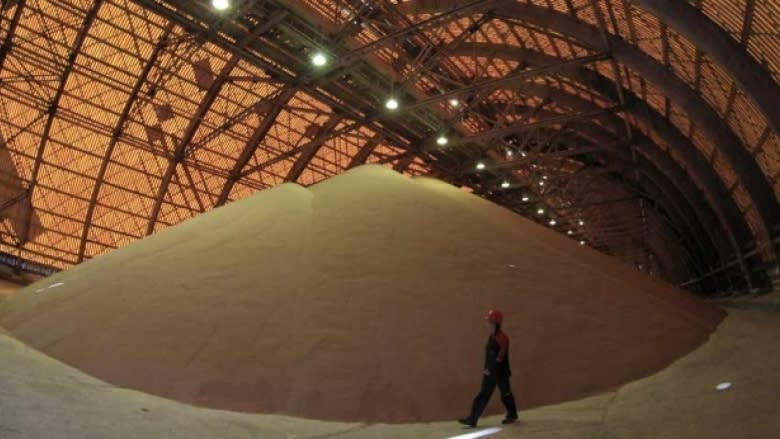Potash developments spark Saskatchewan political fight
As PotashCorp and Agrium enter negotiations on a possible merger, Saskatchewan political leaders can agree on one thing: they want to keep jobs in Saskatchewan, and keep potash royalties streaming into provincial coffers.
They differ on their approach to the potash industry's future.
A few hours after both fertilizer companies announced merger talks Tuesday, Premier Brad Wall told reporters at the provincial legislature he'd spoken with both companies' CEOs, and sees positives in a potential deal.
"We would want to see Sask's interests protected and furthered," Wall said. "We would view this potentially, if it were to come to fruition, as an opportunity to perhaps pursue an even greater corporate presence in Saskatchewan on behalf of the new merged entity."
Agrium is currently headquartered in Calgary. The fertilizer company would not say how many people it currently employs at its potash mine near Vanscoy and its other Saskatchewan operations.
Wall noted his government introduced tax credits last year, aimed at luring more corporate head office jobs to Saskatchewan.
Protecting potash jobs 'critical'
PotashCorp said 2,477 of its employees work in Saskatchewan, including 258 at PotashCorp's head office in Saskatoon. The company has five potash mines in Saskatchewan and strong historical ties to the province, as it was originally created in 1973 as a Crown corporation.
PotashCorp was privatized in 1989 and listed on the Toronto Stock Exchange.
"The industry is very important to Saskatchewan today and for the future, by way of investment and the jobs it creates, the revenues it provides back to government," said Opposition leader Trent Wotherspoon, who said a potential merger should include commitments to keeping jobs in Saskatchewan.
"But I find it strange that the premier is entering this discussion when he's rubber-stamping one of our biggest customers, China, and its state-owned mine to operate here in Saskatchewan, something that could absolutely undermine our potash industry and our world-class companies," said Wotherspoon.
Chinese state-owned company gained environment approval
Former Saskatchewan Environment Minister Herb Cox announced announced Aug. 9 that his ministry had approved Yancoal's 3,000-page environment impact assessment. The Chinese state-owned mining company plans to build a solution mine near Southey, drawing water from Buffalo Pound.
Residents in the surrounding area are divided over the development, citing concerns over water supply and environmental impacts.
Cox said Yancoal must now meet a number of conditions, including creating a community involvement plan, forming a community advisory committee and committing to isolating the site from nearby waterways to "to ensure no off-site impacts to water quality," the government said in a news release.
"You'd be hard-pressed to convince me how it's in our interest economically, to have China, one of our largest potash customers, operate a state-owned potash mine within Saskatchewan," said Wotherspoon, who accused the premier of "rubber-stamping" Yancoal's approvals.
Potash slump, oversupply has led to one mine's closure
Oversupply concerns led the Mosaic Company to lay off 330 employees last month, at its Colonsay potash mine.
With potash currently selling for approximately $150 USD per tonne, analysts say cost-saving measures have driven Agrium and PotashCorp to consider a merger.
"This is sort of textbook in a sense," said University of Saskatchewan business professor Brooke Dobni. "I'm not surprised at all that they're having these discussions now, but they wouldn't have happened three or four years ago when the price was $400-$500 a tonne."
Dobni warned that the current slump in commodity prices will likely last several more years.
"Part of the merger talk would be how could we control costs better in a bigger unit," said Dobni. "It's not necessarily going to be an expansion in jobs."
A merger between PotashCorp and Agrium would require approval from Canada's Competition Bureau.





